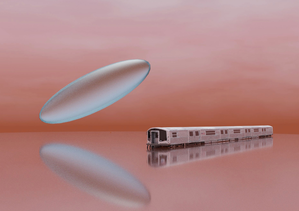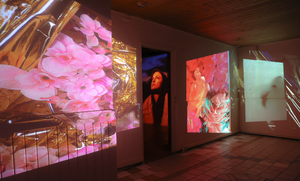Projekte: 2022
Mystery Train _ Yoni Hong
Es ist keine lange Reise, die angegangen werden muss, um die alte Tankstelle zu erreichen. Aber auch keine besonders kurze. Immer weiter geradeaus, etwas abseits, zwei Brücken und ein starker Wind von rechts. Eine Wendeltreppe, das direkte Rauschen der Autobahn, getaggte Garagentüren und ein Neonlicht mit der Aufschrift “Mystery Train” lassen einen Wissen, dass wir angekommen sind.
Angekommen sind wir dennoch nicht, es ist nur der Anfang einer Reise, die kein Ende in Sicht hat. Es bleibt uns überlassen, ob wir draufspringen oder abspringen wollen.
Der Mystery Train rauscht weiterhin durch uns hindurch oder an uns vorbei.
Aber lasst uns für einen Augenblick zum Empirischen an diesen Ort zurückkehren, wo der aufgebrochene Asphalt und der leichte Dieselmotorgeruch uns ein Gefühl des deja-vu verleihen.
Es ist ein Ort der Anonymität, Einsamkeit und Entwurzelung - ein klassischer Transit-Ort.
Ein Nicht-Ort1, das ist nach Marc Augé ein Ort, an dem uns der Mangel an metaphysischen Qualitäten sofort auffällt – das seiner Identität, Relation und Geschichte. An diesem scheinbaren non-lieu können wir diese Eigenschaften jedoch wiederfinden. Die Tankstelle hat genauso viel Identität und Geschichte wie ein verrauchtes Motel am Rande der Stadt. Ausgerechnet an diesen Ort nimmt uns Yoni Hong auf eine Reise mit. Sie versetzt uns ein Stück weit nach Memphis, verwandelt die Tankstelle zu einem Portal, in das wir hinein schlendern können, ohne dabei geführt zu werden. Hong verwandelt den Ort, macht ihn nichtig. Sie raubt uns die Orientierung und vereinnahmt es uns mit Träumen, Welten und schwebenden formen.
Yoni Hong ist in Seoul geboren und hat in Ihrer Kindheit oft ihren Wohnsitz gewechselt, wodurch sie viele Plätze neu erleben und entdecken durfte.
Ihre Fantasie und Einfühlvermögen verleihen Ihr eine Sensibilität für Materialitäten und Formen, die sie schöpferisch in Videoarbeiten oder Installationen umsetzt. Ihr Ansatz gleicht dem von ArchitektInnen oder VideospieldesignerInnen. Ihre stärkste Fähigkeit liegt darin Räumen, Licht und Objekten eine Atmosphäre zu verleihen.
Was wird hier als Atmosphäre bezeichnet? Atmosphäre ist das Erste, was uns beim betreten eines Raumes trifft, sofortige Berührung, sofortige Ablehnung. Atmosphäre spricht unsere emotionale Wahrnehmung an2. Das erste Gefühl, das wir bekommen, die erste Erinnerung, die wir beim betreten eines uns unbekannten Raumes erhalten ist auf Atmosphäre zurückzuführen. Yoni Hong besitzt diese emotionale Wahrnehmung und sie verbindet wie eine Ingenieurin, Architektin oder Filmemacherin alle Elemente-Form, Material, Musik, Bewegung, Komposition, Text und alles, was man braucht, um den Träumen am nähesten zu kommen.
So wie JMW Turner 1844 zu John Ruskin sagte, kann auch Yoni Hong behaupten.
Atmosphere is my Style 3 _________________________________________________________
1(Augé, M. (2016). Non-lieux: Introduction à une anthropologie de la surmodernité. Éditions du Seuil.)
2 Zumthor, P. (2004). In Peter Zumthor - Atmosphären: Architektonische Umgebungen. die dinge um mich herum.
3Zumthor, P. (2004). In Peter Zumthor - Atmosphären: Architektonische Umgebungen. die dinge um mich herum.
The Holy Petrol Station of Imaginary Penitents _ Krzysztof Honowski
Zosimas
by Maggie Siebert
She’s digging through hard soil at the base of a modest tree. She’s pulling clumps of mushrooms from the earth and placing them in her mouth with her thumb and forefinger. Deliberate. Her flesh sits against her bones as if vacuum sealed. Her hair is a miasma of knots. She is naked and shuddering in the cold night air.
Beaten to shreds by sunlight, she traverses the public park where I have sometimes seen her in relative darkness. People amble down the path several yards ahead of me, but I am the only one who sees her. No one is used to seeing skin like hers anymore. She is scaled like a lizard, covered in big, dry, hardened patches which crack and reform and no longer shed. There is dirt caught between the layers. She could be aged like a tree if cut in half.
I do not yet know if she can see me. In truth, I am still uncertain of her humanity. I begin to approach her as if I’m trying not to startle a cat. After my first steps, she turns to face me, slow and deliberate. I see that she is, despite appearances, more like me than something else. I hold out my hand, and when she does not come to it I ask if she needs any help.
For a time she is silent. Then, in warbling but nevertheless clear tones, she says: “Will you bring me my coat?”
And before me is a coat where there was once only grass.
I pick it up and hand it to her. She pulls it around her shoulders and slumps backward onto the ground. I stand there unsure of what to do next until she punches the ground beside her once, hard, and gestures at me to sit with her open palm.
“I want to tell you about something that happened to me,” she says. So I sit and listen.
–
Many years ago she awoke floating atop a sea of people. They stood beneath her and guided her body with their hands. None of them were clothed. When she looked out to see where the ocean of bodies might end, she could see only the tops of heads far into the horizon. She panicked and tried to stand and run across them, but she immediately lost her balance. When she tried to pull herself forward, as if swimming, the people below flipped her onto her back. Paralyzed by fear, she allowed herself to float for a while, letting the hands carry her where they wanted. But soon bodies began to rise from the crowd, and she was no longer the only one lost at sea. She rejoiced, and the hands directed her closer to the new castaways, whom she embraced. And when she did she felt herself grow slick and it was the natural thing to pull them
inside her, or to insert herself inside them. As she did, more bodies rose to join them and the hands beneath pushed them faster and faster. And soon she could not tell herself from others. It was as if her tongue was many, her hands ever multiplying, a hot, pulsating, oppressive and sweet sensation flooding her senses until it all blended into skin: an endless, rolling wall, wet like the inside of a cheek in some places but covered in papules and moles and hair in others. She could not say how long she persisted in this state, whether weeks or decades. But after a time, perception itself started to give way. As her vision was about to give way to nothing but blinding white heat, she hit the ground hard.
–
I sit with her for a long time after she finishes her story. Just a little beyond us, the halogen lights illuminating a walkway flick off. The park is closed for the night. I wonder where she will sleep but decide I don’t actually care to know.
I ask her why she wanted to tell me all this.
She looks at the dirt before her and picks something out of her teeth. I wonder if she will speak at all. And then she looks at me and says, not out loud, but just in my head:
“I wanted someone to know that things are better for me now.”





